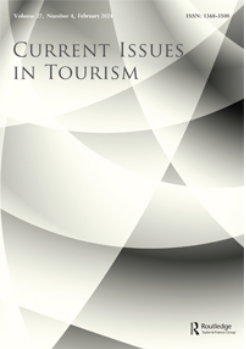宗教游客社交媒体使用行为的决定因素
IF 4.6
3区 管理学
Q1 HOSPITALITY, LEISURE, SPORT & TOURISM
引用次数: 0
摘要
摘要宗教现象作为人类行为的重要组成部分,是旅游的主要动因之一。虽然宗教旅游运动不断增加,但宗教游客在社交媒体等各种传播平台上的行为模式大多被忽视。本研究的目的是基于技术接受模型,探讨宗教游客在社交媒体上分享旅游体验的意愿的前因。这些数据是从325名访问梵蒂冈城的国际游客中收集的。研究结果表明,用户使用社交媒体的体验水平影响感知有用性和感知易用性,这是在社交媒体上分享旅游体验意愿的重要决定因素。结果还突出了宗教信仰水平对这些变量之间关系的负向调节作用。因此,本研究通过表明宗教游客是一个具有不同宗教程度和社交媒体使用模式的异质细分市场,对文献做出了贡献。关键词:宗教旅游;社交媒体;技术接受模型;宗教程度;本文章由计算机程序翻译,如有差异,请以英文原文为准。
Determinants of religious tourists’ social media usage behaviour
ABSTRACTThe phenomenon of religion, as a crucial element of human behaviour, is one of the main motives for travelling. Although religious tourism movements are increasing, the behaviour patterns of religious tourists on various communication platforms such as social media have been mostly neglected. The objective of this study is to examine the antecedents of religious tourists’ intention to share tourism experiences on social media, based on the Technology Acceptance Model. The data were collected from 325 international tourists visiting Vatican City. Findings indicated that user experience level with social media influences perceived usefulness and perceived ease of use, which are significant determinants of intention to share tourism experiences on social media. Results also highlighted the negative moderating role of religiosity level on the relationship between these variables. Hereby, the study contributed to the literature by showing that religious tourists represent a heterogeneous market segment having different religiosity levels and social media usage patterns.KEYWORDS: Religious tourismsocial mediatechnology acceptance modelreligiosity leveluser experience levelVatican City Disclosure statementNo potential conflict of interest was reported by the author(s).
求助全文
通过发布文献求助,成功后即可免费获取论文全文。
去求助
来源期刊

Current Issues in Tourism
HOSPITALITY, LEISURE, SPORT & TOURISM-
CiteScore
15.50
自引率
10.00%
发文量
230
期刊介绍:
Journal metrics are valuable for readers and authors in selecting a publication venue. However, it's crucial to understand that relying on any single metric provides only a partial perspective on a journal's quality and impact. Recognizing the limitations of each metric is essential, and they should never be considered in isolation. Instead, metrics should complement qualitative reviews, serving as a supportive tool rather than a replacement. This approach ensures a more comprehensive evaluation of a journal's overall quality and significance, as exemplified in Current Issues in Tourism.
 求助内容:
求助内容: 应助结果提醒方式:
应助结果提醒方式:


